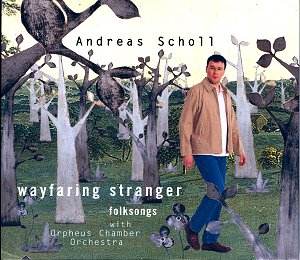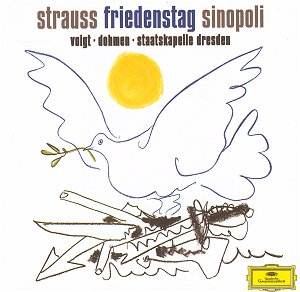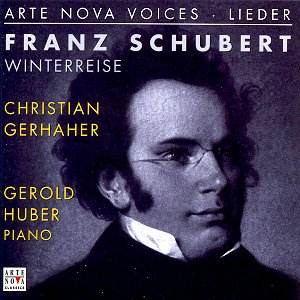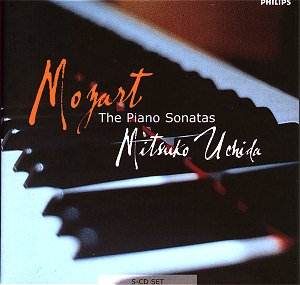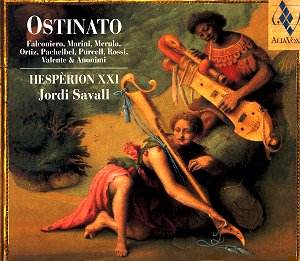 Composer: Ostinato
Composer: Ostinato
Works: Antonio Valente – Gallarda Napolitana; Diego Ortiz – Zarabanda; Passamezzo antico V; Romanesca; Passamezzo Moderno II; Ruggiero Quinta pars IX; Salomone Rossi – Sopra l’Aria di Ruggiero; Andrea Falconiero – Passacalle; Ciaccona; Tarquinio Merula – Ruggiero; Biagio Marini – Passacalio; Francisco Correa de Arauxo – 3 Glosas sobre Todo el mundo en general; Tarquinio Merula – Ciaccona; Henry Purcell – Sonata a 2; 3 parts upon a Ground; Johann Pachelbel – Kanon und Gigue; Anonymous – Greensleeves to a Ground; Canarios (improvisation)
Performers: Hespèrion XXI, Jordi Savall
Recording: Rec: December 2000, June 2001, Chiesa di San Giorgio, Morbio Inferiore, Switzerland
Label: ALIA VOX AV 9820 [72.55]
Jordi Savall’s Hespèrion XXI continues to explore the rich tapestry of early music with its latest offering, featuring a kaleidoscopic range of variations from a host of composers, including the likes of Pachelbel and Purcell. The album, aptly titled Ostinato, reflects a commitment to the intricate forms of variation that permeate the Baroque and Renaissance periods. This release, while showcasing the versatility of the ensemble, unfortunately reveals itself as a double-edged sword, as the concept of uniting disparate works under the theme of variation leads to a certain monotony across its lengthy duration.
From the outset, the program features a wealth of musical treasures, each piece a testament to the ingenuity of its composer. The spirited “Gallarda Napolitana” by Antonio Valente and the intricate “Zarabanda” by Diego Ortiz serve as captivating introductions to the album’s premise. However, the selection’s reliance on variations, while thematically coherent, becomes a limiting factor as one listens more intently. Each piece, though performed with Savall’s impeccable attention to historical accuracy, begins to blend into a composite that lacks the necessary contrasts that would invigorate the listening experience.
The performance itself benefits from Savall’s unparalleled command of the viol, which imbues each note with a warmth and resonance that is characteristic of his artistry. The ensemble’s cohesion, particularly in the more complex textures of pieces like Pachelbel’s “Kanon und Gigue,” showcases their technical prowess, with each musician contributing to a rich tapestry of sound. Yet, one cannot help but feel that the uniformity of the musical structure leads to a sense of stasis. The improvisational flair present in the “Canarios” serves as a delightful diversion, momentarily breaking the pattern, yet it is not enough to sustain engagement through the entirety of the disc.
The recording quality, captured in the acoustically resonant Chiesa di San Giorgio, offers a warm ambience that enhances the instrumental colors. The clarity and balance between the instruments are commendable, allowing for intricate dialogues to emerge, particularly in the more polyphonic works. However, this sonic clarity does not entirely compensate for the lack of dynamic variety inherent in the program’s design.
Savall has undoubtedly produced many notable recordings that showcase the vibrancy and diversity of early music. Comparatively, this album falls short when held against the more thematically varied offerings in his discography, such as his interpretations of Marin Marais or his explorations of Spanish music, where each work is a distinct narrative rather than part of a singular thematic thread.
The thoughtful selection of works on Ostinato reflects Savall’s deep respect for the music of the past, yet this latest installment ultimately succumbs to the pitfalls of its own conceptual framework. While individual performances shine and the musicianship remains exemplary, the overarching experience lacks the necessary dynamism to hold the listener’s attention through its entirety. As such, this recording may serve as a delightful collection of isolated gems, yet it does not coalesce into a compelling whole that rivals Savall’s previous endeavors.
